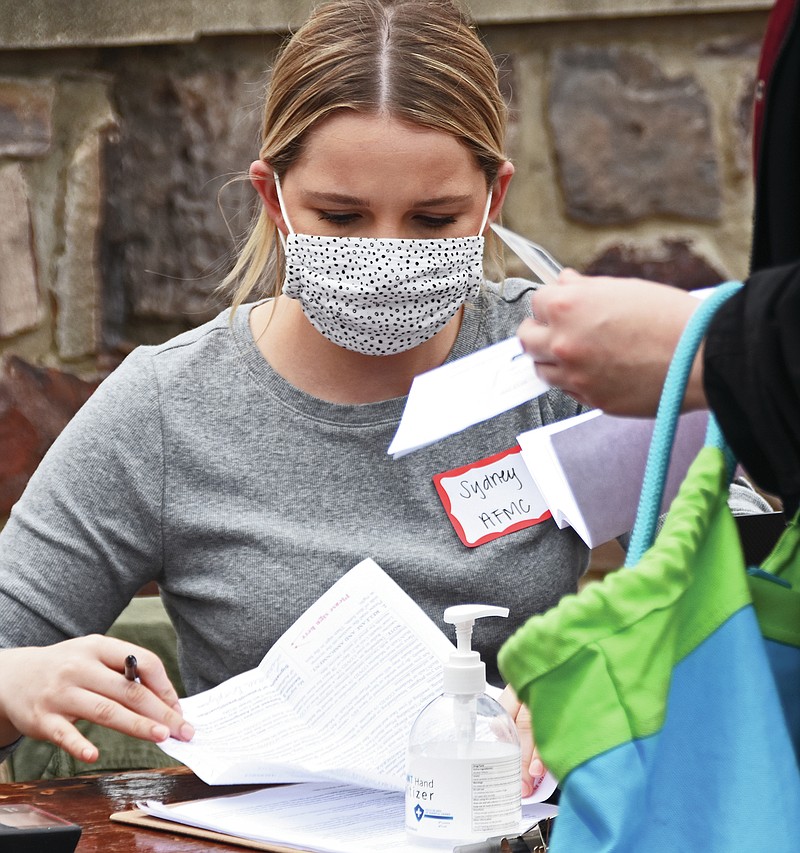Proving eligibility to receive one of the coveted covid-19 vaccines in Arkansas can involve providing a pay stub, a letter from an employer or maybe just a person's word -- it all depends.
With phones at pharmacies ringing nonstop and people lining up around the block at vaccine clinics, health care workers are trying to balance the bureaucracy and efficiency of Arkansas' vaccination plan.
Since the state last week expanded the group eligible for the vaccines, more responsibility of verifying who is and who isn't eligible for a shot has been placed on front-line health workers.
Beginning on March 8, everyone in the Arkansas Department of Health's 1-B priority group was eligible for a shot. That group includes government workers, farmers, grocery store employees, priests and Uber Eats drivers.
GALLERY: Click here for more photos » arkansasonline.com/315covid19/
The Health Department recommends that people bring a work ID, a letter from an employer or a pay stub to verify that they are in the 1-B group. Those who qualify because they are age 65 or older can show an ID to verify their age.
In some cases, verifying whether someone is eligible is a straightforward process; in other cases, it's more difficult.
For instance, a Wednesday memo from the Health Department clarified that while clergy members, such as pastors, priests and other faith leaders, qualify for a shot, that "does not include administrative staff, Sunday school teachers, choir directors, or the members of a congregation or place of worship."
"It's not always clear who might fall into those categories," said Nicki Hilliard, director of professional affairs at the Arkansas Pharmacists Association.
With a gray area in some categories, it leaves many of those administering the vaccines with only their "best judgment" to determine who is eligible, Hilliard said. It's a judgment call that can be difficult, especially when shot-givers are already dealing with the logistics and bureaucracy of billing, inventory, arranging appointments and managing patient records.
Hilliard said that while the state guidelines are mostly clear, there is a worry that they can turn pharmacists and other health workers into the "vaccine police."
"You know, we do want everybody to get a vaccine, but they are definitely trying to follow the state guidelines," Hilliard said. "And when they hear where hospitals or clinics are not adhering to those guidelines very well, then it puts them in a difficult position."
Alexa Overton, who was vaccinated at a walk-up clinic in Little Rock on Wednesday, said she had a pay stub proving she was eligible for a shot, but workers at the clinic didn't ask to see it.
"I'm fine with the honor system. Hopefully people are honest, but in my opinion, everyone should be vaccinated and none of the vaccines should go to waste," Overton said.
Nathan Ray, chief business officer for the Arkansas Foundation for Medical Care, one of the clinic sponsors, said some seeking vaccinations were turned away for not being in an eligible group.
The verification process for the event was not meant to be cumbersome, a volunteer said, with workers asking people to present something -- a letter, a badge or an app on their phone -- showing where they worked or how they were otherwise qualified to receive a shot.
"It's kind of a balance between efficacy, you know, getting the vaccines out there and slowing things down to put the regulation in process," said Dr. Jennifer Dillaha, the state's chief epidemiologist. "And we don't have the type of staff that it would take to make it heavily regulated."
While clinics and pharmacists can be cut out of the state's vaccination plan if they don't follow the guidelines for priority groups, Dillaha said, instances of that are rare, as most do their best to follow the regulations.
"I wouldn't say it hasn't happened, but I would say it's not a huge problem right now," Dillaha said. "Most of our vaccinators are quite willing to vaccinate according to the priority groups because they want to continue to receive vaccines."
In some cases, the verification process is simple. Tami Murphy, a pharmacist at Melvin's Discount Pharmacy in El Dorado, said she vaccinated about 60 people a day last week without turning anyone away.
Sometimes the appointments at Melvin's are done through employers; sometimes human resources representatives follow up to make sure everything is in order. When someone calls for a vaccination appointment, the pharmacy explains that the person needs to provide proof of eligibility, Murphy said.
"Everybody has been real spot-on with having the credentials, and it's made it really easy," Murphy said.
